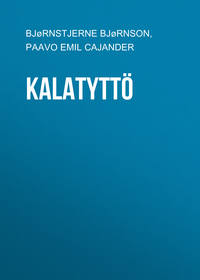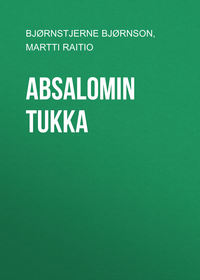 полная версия
полная версияAbsalom's Hair
What then did she do? She studied; she had given up writing: for more than one reason it had become distasteful to her. She had changed roles with her husband, giving herself up to mathematics, chemistry, and physics, she made calculations and analyses—sending for books and materials for these objects. The people on the estate saw nothing extraordinary in all this. From the first they had admired her delicacy and beauty. Every one admired her; it was only the manner and degree that varied.
Little by little she came to be regarded as one whose life and thoughts were beyond their comprehension.
She sought no one, but to those who came to her she never refused help—more or less. She made herself well acquainted with the facts of each case; no one could ever deceive her. Whether she gave much or little, she imposed no conditions, she never lectured them. Her opinion was expressed by the amount that she gave.
Her husband's behaviour towards her was such that, had she not been very popular, she could not have remained at Hellebergene; that is to say, he opposed and thwarted her in every way he could; but every one took her part.
The boy! Could not he have been a bond of union? On the contrary, there were those who declared that it was from the time of his birth that things had gone amiss between the parents. The first time that his father saw him the nurse reported that he "came in like a lord and went out like a beggar!" The mother lay down again and laughed; the nurse had never seen the like of it before. Had he expected that his child must of necessity resemble him, only to find it the image of its mother?
When the boy was old enough he loved to wander across to his father's rooms where there were so many curious things to see; his father always received him kindly, talking in a way suited to his childish intelligence, but he would take occasion to cut away a quantity of his hair. His mother let it grow free and long like her own, and his father perpetually cut it. The boy would have been glad enough to be rid of it, but when he grew a little older, he comprehended his father's motive, and thenceforth he was on his guard.
When the people on the estate had told him something of his father's highly-coloured histories of his feats of strength and his achievements by land and water, the boy began to feel a shy admiration for him, but at the same time he felt all the more strongly the intolerable yoke which he laid upon them—upon every living being on the estate. It became a secret religion with him to oppose his father and help his mother, for it was she who suffered. He would resemble her even to his hair, he would protect her, he would make it all up to her. It was a positive delight to him when his father made him suffer: he absolutely felt proud when he called him Rafaella, instead of Rafael, the name which his mother had chosen for him; it was the one that she loved best.
No one was allowed to use the boats or the carriage, no one might walk through the woods, which had been fenced in, the horses were never taken out. No repairs were undertaken; if Fru Kaas attempted to have anything done at her own expense, the workmen were ordered off: there could no longer be any doubt about it, he wished everything to go to rack and ruin. The property went from bad to worse, and the woods—well! It was no secret, every one on the place talked about it—the timber was being utterly ruined. The best and largest trees were already rotten; by degrees the rest would become so.
At twelve years of age Rafael began to receive religious teaching from the Dean: the only subject in which his mother did not instruct him. He shared these lessons with Helene, the Dean's only child, who was four years younger than Rafael and of whom he was devotedly fond.
The Dean told them the story of David. The narrative was unfolded with additions and explanations; the boy made a picture of it to himself; his mother had taught him everything in this way.
Assyrian warriors with pointed beards, oblique eyes, and oblong shields, had to represent the Israelites; they marched by in an endless procession. He saw the blue-green of the vineyards on the hillside, the shadow of the dusty palm-trees upon the dusty road. Then a wood of aromatic trees into which all the warriors fled.
Then followed the story of Absalom.
"Absalom rebelled against his father, what a dreadful thing to think of," said the Dean. "A grown-up man to rebel against his father." He chanced to look towards Rafael, who turned as red as fire.
The thought which was constantly in his mind was that when he was grown up he should rebel against his father.
"But Absalom was punished in a marvellous manner," continued the Dean. "He lost the battle, and as he fled through the woods, his long hair caught in a tree, the horse ran away from under him, and he was left hanging there until he was run through by a spear."
Rafael could see Absalom hanging there, not in the long Assyrian garments, not with a pointed beard. No! Slender and young, in Rafael's tight-fitting breeches and stockings, and with his own red hair! Ah! how distinctly he saw it! The horse galloping far away—the grey one at home which he used to ride by stealth when his father was asleep after dinner. He could see the tall, slender lad, dangling and swaying, with a spear through his body. Distinctly! Distinctly!
This vision, which he never mentioned to a soul, he could not get rid of. To be left hanging there by his hair—what a strange punishment for rebelling against his father!
Certainly he already knew the history, but till now he had paid no special heed to it.
It was on a Friday that this great impression had been made on him, and on the following Thursday morning he awoke to see his mother standing over him with her most wondering expression. Her hair still as she had plaited it for the night; one plait had touched him on the nose and awoke him before she spoke. She stood bending over him, in her long white nightgown with its dainty lace trimming, and with bare feet. She would never have come in like that if something terrible had not happened. Why did she not speak? only look and look—or was she really frightened?
"Mother!" he cried, sitting up.
Then she bent close down to him. "THE MAN IS DEAD," she whispered. It was his father whom she called "the man," she never spoke of him otherwise.
Rafael did not comprehend what she said, or perhaps it paralysed him. She repeated it again louder and louder, "The man is dead, the man is dead."
Then she stood upright, and putting out her bare feet from under her nightgown, she began to dance—only a few steps; and then she slipped away through the door which stood half open. He jumped up and ran after her; there she lay on the sofa, sobbing. She felt that he was behind her, she raised herself quickly, and, still sobbing, pressed him to her heart.
Even when they stood together beside the body, the hand which he had in his shook so that he threw his arms round her, thinking that she would fall.
Later in life, when he recalled this, he understood what she had silently endured, what an unbending will she had brought to the struggle, but also what it had cost her.
At the time he did not in the least comprehend it. He imagined that she suffered from the horror of the moment as he himself did.
There lay the giant, in wretchedness and squalor! He who had once boasted of his cleanliness, and expected the like in others, lay there, dirty and unshaven, under dirty bed clothes, in linen so ragged and filthy that no workman on the estate had worse. The clothes which he had worn the day before lay on a chair beside the bed, miserably threadbare, foul with dirt, sweat, and tobacco, and stinking like everything else. His mouth was distorted, his hands tightly clenched; he had died of a stroke.
And how forlorn and desolate was all around him! Why had his son never noticed this before? Why had he never felt that his father was lonely and forsaken? To how great an extent no words could express.
Rafael burst into tears; louder and louder grew his sobbing, until it sounded through all the rooms. The people from the estate came in one by one. They wished to satisfy their curiosity.
The boy's crying, unconsciously to himself, influenced them all: they saw everything in a new light. How unfortunate, how desolate, how helpless had he been who now lay there. Lord, have mercy on us all!
When the corpse of Harald Kaas had been laid out, the face shaved, and the eyes closed, the distortion was less apparent. They could trace signs of suffering, but the expression was still virile. It seemed a handsome face to them now.
CHAPTER 2
Within a few days of the funeral mother and son were in England.
Rafael was now to enter upon a long course of study, for which, by his earlier education, his mother had prepared him, and for which, by painful privations, she had saved up sufficient money.
The property was to the last degree impoverished, and burdened with mortgages, and the timber only fit for fuel.
Their neighbour the Dean, a clear-headed and practical man, took upon himself the management of affairs; as money was needed the work of devastation must begin at once. The mother and son did not wish to witness it.
They came to England like two fugitives who, after many and great trials, for affection's sake seek a new home and a new country.
Rafael was then twelve years old.
They were inseparable, and in the shiftless life that they led in their new surroundings they became, if possible, more closely attached to each other.
Yet not long afterwards they had their first disagreement.
He had gone to school, had begun to learn the language and to make friends, and had developed a great desire to show off.
He was very tall and slender and was anxious to be athletic. He took an active part in the play-ground, but here he achieved no great success. On the other hand, thanks to his mother, he was better informed than his comrades, and he contrived to obtain prominence by this. This prominence must be maintained, and nothing answered so well as boasting about Norway and his father's exploits. His statements were somewhat exaggerated, but that was not altogether his fault, He knew English fairly well, but had not mastered its niceties. He made use of superlatives, which always come the most readily. It was true that he had inherited from his father twenty guns, a large sailing-boat, and several smaller ones; but how magnificent these boats and guns had become!
He intended to go to the North Pole, he said, as his father had done, to shoot white bears, and invited them all to come with him.
He made a greater impression on his hearers than he himself was aware of; but something more was wanted, for it was impossible to foretell from day to day what might be expected of him. He had to study hard in order to meet the demand.
As an outcome of this, he betook himself one evening to the hairdresser's, with some of his schoolfellows, and, without more ado, requested him to cut his hair quite close. That ought to satisfy them for a long time.
The other boys had teased him about his hair, and it got in the way when he was playing—he hated it. Besides, ever since the story of Absalom's rebellion and punishment, it had remained a secret terror to him, but it had never before occurred to him to have it cut off.
His schoolfellows were dismayed, and the hairdresser looked on it as a work of wilful destruction.
Rafael felt his heart begin to sink, but the very audacity of the thing gave him courage They should see what he dare do. The hairdresser hesitated to act without Fru Kaas's knowledge, but at length he ceased to make objections.
Rafael's heart sank lower and lower, but he must go through with it now. "Off with it," he said, and remained immovable in the chair.
"I have never seen more splendid hair," said the hairdresser diffidently, taking up the scissors but still hesitating.
Rafael saw that his companions were on the tiptoe of expectation. "Off with it," he said again with assumed indifference.
The hairdresser cut the hair into his hand and laid it carefully in paper.
The boys followed every snip of the scissors with their eyes, Rafael with his ears; he could not see in the glass.
When the hairdresser had finished and had brushed his clothes for him, he offered him the hair. "What do I want with it?" said Rafael. He dusted his elbows and knees a little, paid, and left the shop, followed by his companions. They, however, exhibited no particular admiration. He caught a glimpse of himself in the glass as he went out, and thought that he looked frightful.
He would have given all that he possessed (which was not much), he would have endured any imaginable suffering, he thought, to have his hair back again.
His mother's wondering eyes rose up before him with every shade of expression; his misery pursued him, his vanity mocked him. The end of it all was that he stole up to his room and went to bed without his supper.
But when his mother had vainly waited for him, and some one suggested that he might be in the house, she went to his room.
He heard her on the stairs; he felt that she was at the door. When she entered he had hidden his head beneath the bedclothes. She dragged them back; and at the first sight of her dismay he was reduced to such despair that the tears which were beginning to flow ceased at once.
White and horror-struck she stood there; indeed she thought at first that some one had done it maliciously; but when she could not extract a word of enlightenment, she suspected mischief.
He felt that she was waiting for an explanation, an excuse, a prayer for forgiveness, but he could not, for the life of him, get out a word.
What, indeed, could he say? He did not understand it himself. But now he began to cry violently. He huddled himself together, clasping his head between his hands. It felt like a bristly stubble.
When he looked up again his mother was gone.
A child sleeps in spite of everything. He came down the next morning in a contrite mood and thoroughly shamefaced. His mother was not up; she was unwell, for she had not slept a wink. He heard this before he went to her. He opened her door timidly. There she lay, the picture of wretchedness.
On the toilet-table, in a white silk handkerchief, was his hair, smoothed and combed.
She lay there in her lace-trimmed nightgown, great tears rolling down her cheeks. He had come, intending to throw himself into her arms and beg her pardon a thousand times. But he had a strong feeling that he had better not do so, or was he afraid to? She was in the clouds, far, far away. She seemed in a trance: something, at once painful and sacred, held her enchained. She was both pathetic and sublime.
The boy stepped quietly from the room and hurried off to school.
She remained in bed that day and the next, and made him sit with the servant in order that she might be alone. When she was in trouble she always behaved thus, and that he should cross her in this way was the greatest trial that she had ever known. It came upon her, too, like a deluge of rain from a clear sky. NOW it seemed to her that she could foresee his future—and her own.
She laid the blame of all this on his paternal ancestry. She could not see that incessant artistic fuss and too much intellectual training had, perhaps, aroused in him a desire for independence.
The first time that she saw him again with his cropped head, which grew more and more like his father's in shape, her tears flowed quietly.
When he wished to come to her side, she waived him back with her shapely hand, nor would she talk to him; when he talked she hardly looked at him; till at last he burst into tears. For he suffered as one can suffer but once, when the childish penitence is fresh and therefore boundless, and when the yearning for love has received its first rebuff.
But when, on the fifth day, she met him coming up the stairs, she stood still in dismay at his appearance: pale, thin, timid; the effect perhaps heightened by the loss of his hair. He, too, stood still, looking forlorn and abject, with disconsolate eyes. Then hers filled; she stretched out her arms. He was once more in his Paradise, but they both cried as though they must wade through an ocean of tears before they could talk to each other again.
"Tell me about it now," she whispered. This was in her own room. They had spoken the first fond words and kissed each other over and over again. "How could this have happened, Rafael?" she whispered again, with her head pressed to his; she did not wish to look at him while she spoke.
"Mother," he answered, "it is worse to cut down the woods at home, at Hellebergene, than that I—"
She raised her head and looked at him. She had taken off her hat and gloves, but now she put them quickly on again.
"Rafael, dear," she said, "shall we go for a walk together in the park, under the grand old trees?"
She had felt his retort to be ingenious.
After this episode, however, England, and more especially her son's schoolfellows, became distasteful to her, and she constantly made plans to keep him away from the latter out of school hours.
She found this very easy; sometimes she went over his studies with him, at others they visited all the Manufactories and "Works" for miles round.
She liked to see for herself and awakened the same taste in him.
Factories which, as a rule, were closed to visitors, were readily opened to the pretty elegant lady and her handsome boy, "who after all knew nothing at all about it;" and they were able to see almost all that they wished. It was a less congenial task to use her influence to turn his thoughts to higher things, but it was rarely, nevertheless, that she failed. She struggled hard over what she did not understand and sought for help. To explain these things to Rafael in the most attractive manner possible became a new occupation for her.
His natural disposition inclined him to such studies; but to a boy of thirteen, who was thus kept from his comrades and their sports, it soon became a nuisance.
No sooner had Fru Kaas noticed this than she took active steps. They left England and crossed to France.
The strange speech threw him back on her; no one shared him with her. They settled in Calais. A few days after their arrival she cut her hair short; she hoped that it would touch him to see that as he would not look like her, she tried to look like him—to be a. boy like him. She bought a smart new hat, she composed a jaunty costume, new from top to toe, for EVERYTHING must be altered with the hair. But when she stood before him, looking like a girl of twenty-five, merry, almost boisterous, he was simply dismayed—nay, it was some time before he could altogether comprehend what had happened. As long as he could remember his mother, her eyes had always looked forth from beneath a crown; more solemn, more beautiful.
"Mother," he said, "where are you?"
She grew pale and grave, and stammered something about its being more comfortable—about red hair not looking well when it began to lose its colour—and went into her room. There she sat with his hair before her and her own beside it; she wept.
"Mother, where are you?" She might have answered, "Rafael, where are you?"
She went about with him everywhere. In France two handsome, stylishly dressed people are always certain to be noticed, a thing which she thoroughly appreciated.
During their different expeditions she always spoke French; he begged her to talk Norse at least now and then, but all in vain.
Here, too, they visited every possible and impossible factory. Unpractical and reserved as she was on ordinary occasions, she could be full of artifice and coquetry whenever she wished to gain access to a steam bakery and particular as she generally was about her toilette, she would come away again sooty and grimy if thereby she could procure for Rafael some insight into mechanics. She shrank from foul air as from the cholera, yet inhaled sulphuric acid gas as though it had been ozone for his sake.
"Seeing for yourself, Rafael, is the substance, other methods are its shadow;" or "Seeing for yourself, Rafael, is meat and drink, the other is but literature."
He was not quite of the same opinion: he thought that Notre Dame de Paris, from which he was daily dragged away, was the richest banquet that he had yet enjoyed, while from the factory of Mayel et fils there issued the most deadly odours.
His reading—she had encouraged him in it for the sake of the language and had herself helped him; now she was jealous of it and could not be persuaded to get him new books; but he got them nevertheless.
They had been in Calais for several months; he had masters and was beginning to feel himself at home, when there arrived at the pension a widow from one of the colonies, accompanied by her daughter, a girl of thirteen.
The new comers had not appeared at meals for more than two days before the young gentleman began to pay his court to the young lady. From the first moment it was a plain case. Very soon every one in the pension was highly amused to notice how fluent his French was becoming; his choice of words at times was even elegant! The girl taught him it without a trace of grammar, by charm, sprightliness, a little nonsense; a pair of confiding eyes and a youthful voice were sufficient. It was from her that he got, by stealth, one novel after another. By stealth it had to be; by stealth Lucie had procured them; by stealth she gave them to him; by stealth they were read; by stealth she took them back again. This reading made him a little absent-minded, but otherwise nothing betrayed his flights into literature: to be sure, they were not very wonderful.
Fru Kaas noticed her son's flirtation, and smiled with the rest over his progress in French. She had less objection to this friendship, in which, to a great extent, she shared, than to those in England, from which she had been quite excluded. In the evenings she would take the mother and daughter out for short excursions; and these she greatly enjoyed. But the novel reading which the young people carried on secretly had resulted in conversations of a "grown up" type. They talked of love with the deep experience which is proper to their age, they talked with still greater discretion as to when their wedding should take place; on this point they indirectly said much which caused them many a delightful tremor. As they were accustomed to talk about themselves before others, to describe their feelings in a veiled form, it often happened when there were many people near that they carried this amusement further, and before they were themselves aware of it, they were in the full tide of a symbolic language and played "catch" with each other.
Fru Kaas noticed one evening that the word "rose" was drawn out to a greater length than it was possible for any rose to attain to; at the same time she saw the languishing look in their eyes, and broke in with the question, "What do you mean about the rose, child?"
If any one had peeped behind a rose-bush and caught them kissing one another, a thing they had never done, they could not have blushed more.
The next day Fru Kaas found new rooms, a long way from the quay near which they were living.
Rafael had suffered greatly at being torn away from England just as he had come down from his high horse and had put himself on a par with his companions, but not the least notice was taken of his trouble; it had only annoyed his mother.
To be absolutely debarred from the books he was so fond of had been hard; but up to this time, being in a foreign land, amid foreign speech, he had always fallen back upon her. Now he openly defied her. He went straight off to the hotel and sought out Madame Mery and her daughter as though nothing had occurred. This he did every day when he had finished his lessons. Lucie had now become his sole romance; he gave all his leisure time to her, and not only that (for it no longer sufficed to see her at her mother's), they met on the quay! At times a maid-servant walked with them for appearance sake, at others she kept in the background. Sometimes they would go on board a Norwegian ship, sometimes they wandered about or strolled beneath some great trees. When he saw her in her short frock come out of the door, saw her quick movements, and her lively signals to him with parasol or hat or flowers, the quay, the ships, the bales, the barrels, the air, the noise, the crowd, all seemed to play and sing,









